National Water Week Poster Competition
Each year, National Water Week makes a splash across Australia, inspiring individuals, education providers, communities and organisations to work together to build community awareness and understanding of water-related issues.
2025 competition is now closed! Winners will be announced during National Water Week (20-26 October 2025)
If you would like to be added to our mailing list to receive information about the competition, email
Water Night
Water Night is a fun and meaningful way to raise awareness about water use.
Sign Up to the Water Night challenge – Thursday 23 October, 5–10pm
Challenge yourself and your families to turn off the taps for five hours and discover how often we reach for water out of habit.
Pop a Phil the Bucket Tap Guardian on your taps to help remind everyone to pause and think—small changes can make a big impact!
We have tap guardians available from reception at 11 McLachlan Street, Horsham.
We place a high value on lakes and weir pools in our region because of the environmental benefits, the opportunities for local communities to enjoy recreational activities, and the visitors they attract to our region.
Our rural pipelines supply water to 14 recreational lakes and weir pools with 12 of them supplied from the Grampians reservoir system through the Wimmera Mallee Pipeline. This is made possible under a 3090 ML recreation water entitlement held by us specifically for this purpose.
We also supply water to Ouyen Lake and Green Lake (near Sea Lake) from our Murray River allocations. Water is delivered to Ouyen Lake through the Northern Mallee Pipeline, while Green Lake’s water is delivered through the Wimmera Mallee Pipeline Supply System 5.
Map of recreation lakes
View a map of where pipeline supplied recreation lakes and weir pools are located in our region.
![]() Recreation Lakes and Weir Pools
Recreation Lakes and Weir Pools
Latest volume levels
Lake |
Volume when full (ML) |
|
Foreshore Management |
Waterway Manager (under Marine Safety Act 2010) |
Waterway rules | |
| Beulah Weir Pool | 140 |
|
Beulah Weir Pool Committee of Management | Unmanaged | State boating rules apply | |
| Brim Weir Pool | 120 | Brim Weir Pool Committee of Management | Unmanaged | State boating rules apply | ||
| Donald Caravan Park Lake | 50 |
|
Buloke Shire Council | Unmanaged | State boating rules apply | |
| Green Lake, Sea Lake | 480 | Green Lake Committee of Management | Unmanaged | Waterway rules as per Schedule 72 | ||
| Lake Lascelles, Hopetoun | 440 | Lake Lascelles Committee of Management | Lake Lascelles and Corrong Committee of Management Inc | State boating rules apply | ||
|
Lake Marma, Murtoa |
170 | Public Park and Gardens Reserve Committee of Management | Lake Marma Public Park and Gardens Reserve Committee of Management | State boating rules apply | ||
| Ouyen Lake | 450 | Ouyen Lake Committee |
Unmanaged |
State boating rules apply | ||
| Rainbow Lake | 35 | Rainbow Lake Committee | Unmanaged | State boating rules apply | ||
| Tchum Lake, Birchip | 730 | Tchum Lake Aquatic Club | Tchum Lake Aquatic Club |
|
||
| Walkers Lake, Avon Plains | 900 |
|
Northern Grampians Shire Council | Northern Grampians Shire Council | State boating rules apply | |
| Warracknabeal Weir Pool | 210 |
|
Yarriambiack Shire Council | Unmanaged |
|
|
| Watchem Lake | 259 | Watchem Lake Committee of Management | Unmanaged | Waterway rules as per Schedule 159 | ||
| Wooroonook Lake | 700 |
|
Wooroonook Committee of Management | Buloke Shire Council |
|
|
| Yaapeet Lake | 40 | Yaapeet Community Club | Unmanaged | State boating rules apply |
All figures are indicative only.
*Refer to the “Vessel Operating and Zoning Rules for Victoria” for the State Boating Rules that apply to all waterways and local Scheduled operating and zoning rules for specific waterways. Rules And Exclusion Zones | Safe Transport Victoria
Recreation Contribution Charge
See how the Recreation Contribution Charge benefits the community and provides discounted water to eligible sporting clubs, service clubs, schools and nominated recreation lake and weirs across our region.
Further information...The role of the Regional Recreation Water Users Group is to provide advice to the GWMWater Board on the development of policies for recreational water distribution and management.
Our rural pipelines also supply water to 51 environmental wetlands in our region.
View recreational activities permitted at our reservoirs and lakes View current water levels at our lakes and reservoirs. |
The GWMWater Board is diverse and multi-faceted, with men and women from all different working and educational backgrounds. Our Board is skills-based and appointed by the Minister for Water. It represents the varied interests of the Grampians Wimmera Mallee region.
The Board is responsible for GWMWater's management in a number of areas. The Board's central purpose is to set the broad strategy and objectives of GWMWater. In doing this, the Board also has responsibility for risk management, organisational efficiencies and compliance, reporting and reviewing.
There are also four standing committees of the Board:
- Environment and Works Committee
- Audit, Governance and Risk Committee
- Carbon, Climate and Resources Committee
- People and Culture Committee
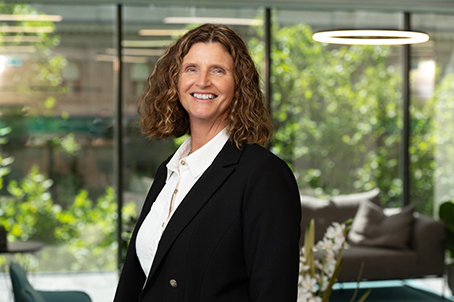
Caroline Welsh
Caroline is a partner in Renney Farms, the family grain farm in Berriwillock. She is a former Chair and long-term Director of the Birchip Cropping Group and has provided independent Chair services for government contracts and organisations. Caroline has 30 years' experience working in agriculture communication, industry development, governance and climate variability in the public and not for profit sectors. Caroline holds advisory roles for state and federal governments. Caroline has a Master of Agribusiness (Marketing), a Graduate Diploma of Rural Resource Management and a Bachelor of Agriculture Science. She completed a Churchill Fellowship in 1998 and is a graduate of the Australian Institute of Company Directors.
Caroline is Chair to the GWMWater Board of Directors.
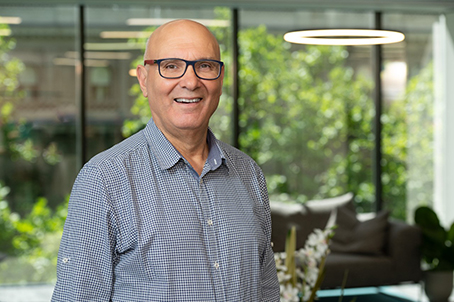
Andrew Nicolaou
Andrew is a recognised leader in Financial and Risk Management Reform, Governance and Performance in the Public Sector, with significant experience in large government business enterprises including the water sector, rural sector and relevant departments. Andrew has significant experience with government and private sector boards, and audit and risk committees. He has a strong knowledge of financial management, risk and regulatory frameworks. Andrew holds a Bachelor of Economics and is a member of the Australian Institute of Company Directors and a Fellow of the Institute of Chartered Accountants. He is the Chair of audit committees at Department of Education, Department of Transport, Parliament of Victoria and Fire Rescue Victoria, and is a Director and member of the Audit Committee of the Victorian Funds Management Corporation.
Andrew is Deputy Chairperson of GWMWater. He is also Chair of the GWMWater Audit, Governance and Risk Committee.
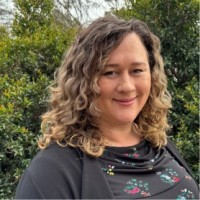
Jess Adler
Jess is a Wimmera local and an experienced governance and finance professional. She has worked across a diverse range of industries and sectors, including economic development, water, local government, resources, community support, and skills and training, lending practical insight and financial expertise to complex organisational challenges.
Jess brings extensive governance experience through executive and advisory positions across public and regulatory agencies, not-for-profit’s, the private sector, and work with ASX-listed entities. An AICD member and CPA, she contributes expertise in audit and risk oversight, compliance, risk management, internal controls, financial management and stakeholder engagement. She is committed to community outcomes and sustainable regional development through sound governance.

Stuart Read
Bio to come.
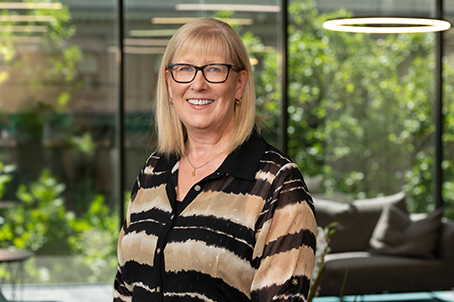
Judith Holt
Jude and her husband are sheep and grain farmers in Wedderburn. She has held senior management roles in local government and the water sector for the past 30 years, and is a Board Director at CVGT Australia Limited and Campaspe Port Enterprises Pty Ltd. Jude is a member of the Audit and Risk Committee for the Department of Families, Fairness and Housing, and the City of Greater Bendigo and is Independent Chair of Fosterville Gold Mine Environment Review Committee and Marist College Bendigo Finance Committee. Jude is a Fellow of the Governance Institute of Australia, has a Graduate Diploma in Applied Corporate Governance, Graduate Certificate in Risk Management, a Bachelor of Business (Accounting), and is a Graduate of the Australian Institute of Company Directors.
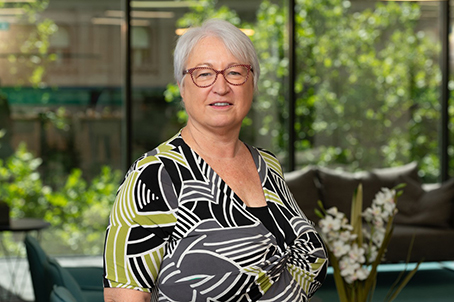
Michelle Jackson
Michelle has worked in the public sector, local government and the trade union movement. Prior to retiring from full time work, Michelle worked for the Australian Services Union (ASU) in senior leadership roles. Michelle was a member of the executive of the ASU and a member of the Finance Committee and Risk Management Committee. She has been a member of the executives of the Victorian Trades Hall Council and Bendigo Trades Hall Council. She has skills in governance, financial management, risk management, strategic planning and industrial relations.
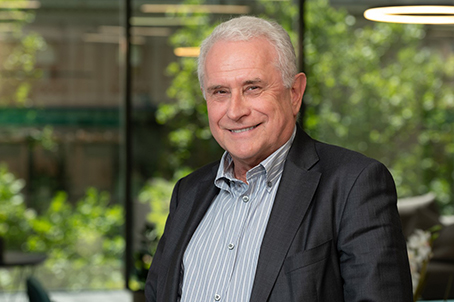
Paul Hardy
Paul has over two decades of board experience with expertise in the infrastructure, engineering, healthcare, sport, education and not-for-profit sectors. At board level he is passionate about driving growth and performance, having led one of the world’s leading engineering, project delivery, advisory and technical services companies and advising startup companies in the pharmaceutical, health, technology, AI and social investments sectors.
He is currently a Partner at PAN Group, investing in and driving the commercialisation of startups and is a director on the boards of VicTrack and Citywide, and is a council member of the LaTrobe University Council. Previously he was the Global CEO of Aurecon, with 80 offices in 22 countries, leading a three-way merger and managing the subsequent strategy, structure and culture alignment along with the five-year strategic roadmap and overseeing multi-billion-dollar projects.
Paul holds a Master of Engineering Science and is a Graduate of the Australian Institute of Company Directors. He has also been recognised by Engineers Australia as one of Australia's 100 most influential engineers (2009–2013) and was one of Monash University’s Distinguished Alumni in 2019.
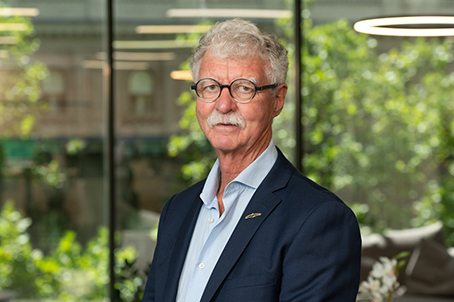
Rodney Jackson
Rod Jackson is a proud Palawa and Cherbourg man, with a breadth of senior leadership experience and knowledge that bridges Government and Aboriginal Businesses.
Past roles include General Manager Operations TTLine’s MVSpirit of Tasmania, Port of Portland Chief Executive Officer and Chief Executive of four Aboriginal Organisations being Gunditjmara, Victorian Aboriginal Health Service (VAHS), Wathaurong and Ngwala Willumbong. Rod was a previous member of the Aboriginal Economic Development Board, National Aboriginal Community Controlled Health Organisation (NACCHO), Victorian Aboriginal Community Controlled Health Organisation Inc (VACCHO), Respect Victoria, Foodbank Victoria, President Portland Football Netball Club, YMCA, Mayors Trust Fund and Rail Projects Victoria.
Rod’s currently the Chairperson of Federation Enterprises and Barpa Construction and the Reconciliation Action Plan Senior Advisor to Consumer Law. He is also a member of Australian Institute of Company Directors (AICD), Advisor and Consultant on Registered Aboriginal Parties (RAP) and holds Board roles with Federation Enterprises, AFL SportsReady, Yuma Yirramboi and Court Services Victoria. Rod is a Reconciliation Adviser to Tract, Greater Western Water and has a short-term contract with Consumer Action Law Centre and is an Advisory Panel Member of the National Indigenous Knowledge's Education Research Innovation Institute at Deakin University and Stolen Generations Reparation Committee. Rod is a Board Director of the Indigenous Trajectory of the Emotional Wellbeing Institute - Geneva.
Rod is an Elder Respected Person on the County and Magistrates Courts, and volunteers with the Independent Visitor Program.
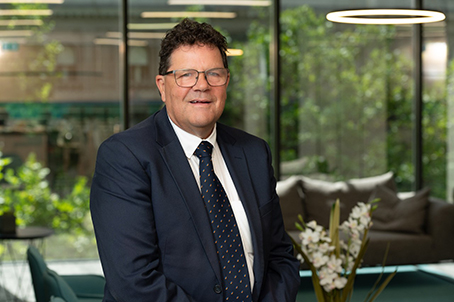
Mark Williams
Mark Williams is a Board Director and is also GWMWater's Managing Director.
Overview
The East Grampians Rural Pipeline will secure the future of the region by providing a reliable, secure supply of high-quality water year-round.
GWMWater awarded the tender to Mitchell Water Australia for the works, which involves the laying of the pipe which will transfer and deliver water to landholders and constructing additional pump stations and water storages.
Access to reliable, high-quality water supplies will help to provide growth opportunities and reduce risk, enabling existing agricultural enterprises to consolidate and expand, and providing opportunities for new enterprises to be developed.
A piped water supply will also provide ongoing water security for townships in the region as well as significant economic, social, recreational and environmental benefits to the region.
Lake Fyans will be the main water source for the East Grampians Rural Pipeline, with smaller volumes of water being sourced from Mt William headworks and the Mt Cole Reservoir.
Landholder construction update
Construction of the East Grampians Rural Pipeline is well underway!
- Works on the Lake Fyans Pump Station are now complete.
- Three hundred kilometres of pipe has now been laid.
- 33 km of Horizontal Directional Drilling (HDD).
- 185 water meters have been installed.
Our focus continues on maximising the number of connections and constructing the pipeline to get water to landholders as soon as possible.
Mininera extension funding confirmed
Landowners in the East Grampians region will be pleased to hear that the Mininera extension of the East Grampians Rural Pipeline (EGRP) has received a funding boost.
GWMWater welcomes the Victorian Government’s announcement of a $15 million investment into the project, bringing total confirmed funding to $30.6 million with GWMWater contributing $15.6 million.
These funds will support the pipeline’s extension into the southern area of the original project scope, where all planning approvals have already been secured.
This funding is good news for landowners and rural communities. It will allow us to continue to maximise the number of properties that can benefit from a secure, high-quality water supply.
Earlier stages of the EGRP are already delivering water to properties in drought-affected areas.
GWMWater remains committed to supporting farmers and communities through ongoing dry seasonal conditions and will be in touch with landowners as soon as more information becomes available about the specific properties that will be reached as part of the extension.
To complete the Mininera extension in full, GWMWater has submitted a funding application to the National Water Grid Authority, requesting a matching contribution of $30.6 million.
We’ll continue to provide updates as they come to hand.
Pipeline water access as the project progresses
As pipeline construction progresses and hydrostatic pressure testing is completed, landholders may be able to access an interim supply of water through their meter prior to project commissioning. Please refer to the live map below to check the availability for your property.
This interim water supply may not meet our standard service obligation as detailed in our Rural Customer Charter. The water supply should have sufficient pressure and flow to reduce the need to cart water until the system is fully commissioned.
Landholders must purchase their water allowance prior to using water from their meter. Water taken in the interim phase will be from landholder’s water allowance entitlement.
Landholders will only be billed for water used during this interim water supply phase. No service charges will apply until GWMWater deems water services to be fully commissioned. The usage charge will be in line with GWMWater’s Schedule of Tariffs, Miscellaneous and Other Charges 2024/25.
As per Landholders heads of agreements, we remind landholders that water must be directly connected to a storage tank from their meter point with sufficient capacity for a minimum of three days peak demand. A minimum air gap of 100 mm must be maintained between the tank filling inlet and tank overflow. For more information, please refer to the below fact sheets.
Landholders are reminded that the raw water being supplied through pipelines is not fit for human consumption. Landholders may use this water for household activities, such as watering gardens, flushing toilets, irrigation, showering/bathing and laundry.
Latest Updates
In the Pipeline... (Edition #21, issued 11 July 2025)
In the Pipeline... (Edition #20, issued 2 June 2025)
In the Pipeline... (Edition #19, issued 24 February 2025)
In the Pipeline... (Edition #18, issued 18 November 2024)
In the Pipeline... (Edition #17, issued 30 July 2024)
In the Pipeline... (Edition #16, issued 23 December 2023)
In the Pipeline... (Edition #15, issued 22 November 2023)
In the Pipeline... (Edition #14, issued 9 August 2023)
In the Pipeline... (Edition #13, issued 20 June 2023)
In the Pipeline... (Edition #12, issued 21 March 2023)
In the Pipeline... (Edition #11, issued 17 November 2021)
In the Pipeline... (Edition #10, issued 23 September 2021)
In the Pipeline... (Edition #9, issued 15 June 2021)
To receive the lastest updates straight to your email inbox, sign up for East Grampians Rural Pipeline Project e-News updates
Service area and network design
On completion, the scheme may service up to 1000 rural farming properties over an area of up to 200,000 hectares with a reticulated non-drinking water supply.
We are pleased to share the preliminary pipe alignments for the East Grampians Rural Pipeline project. Click here to view the interactive map in full screen.
Please note that all pipe alignments are subject to change due to physical site conditions, customer interest and outcomes of cultural heritage and environmental investigations. The map will be updated as more information becomes available and the project progresses.
- Ararat - Clause 45.12 - Schedule Change - EGRP
- Ararat - Clause 72.04 - Schedule Change - EGRP
- Explanatory Report - DRAFT - EGRP project
- Incorporated Document - DRAFT - EGRP project
- Northern Grampians - Clause 45.12 - Schedule Change - EGRP
- Northern Grampians - Clause 72.04 - Schedule Change - EGRP
- Pyrenees - Clause 45.12 - New Overlay - EGRP
- Pyrenees - Clause 45.12 - Schedule Change - EGRP
- Pyrenees - Clause 72.04 - Schedule Change - EGRP
Decision under Environment Effects Act
The Minister for Planning has decided that an Environment Effects Statement (EES) is not required for the East Grampians Rural Pipeline.Read more: REFERRAL 2019-R01.
Expressions of Interest now closed
Expressions of Interest (EOI) to be included in the pipeline design have now closed. EOIs can still be submitted, but your property will not be included in the pipeline design if it is not already fronted by a proposed pipe alignment.
What you need to know
We have created a series of fact sheets which will help you with what you need to know and do to connect to the East Grampians Pipeline.
![]() East Grampians Rural Pipeline - Overview (3MB, 2 pages)
East Grampians Rural Pipeline - Overview (3MB, 2 pages)
![]() East Grampians Rural Pipeline - Planning (6.5MB, 3 pages)
East Grampians Rural Pipeline - Planning (6.5MB, 3 pages)
![]() East Grampians Rural Pipeline - Connection (6.4MB, 4 pages)
East Grampians Rural Pipeline - Connection (6.4MB, 4 pages)
![]() East Grampians Rural Pipeline - Transitioning from an existing supply to a Rural Pipeline Supply (4MB, 3 pages)
East Grampians Rural Pipeline - Transitioning from an existing supply to a Rural Pipeline Supply (4MB, 3 pages)
![]() East Grampians Rural Pipeline - Construction Frequently Asked Questions (2MB, 3 pages)
East Grampians Rural Pipeline - Construction Frequently Asked Questions (2MB, 3 pages)
On-Farm Water Reticulation Guide
We've published a comprehensive On-Farm Water Reticulation Guide to help you design and install your on-farm system. The guide provides practical and technical advice covering all aspects of a piped on-farm system. Download a copy or contact us to get your free printed copy of the guide.
![]() On Farm Water Reticulation Guide
On Farm Water Reticulation Guide
Online water calculator available
To assist landholders with calculating water requirements, we encourage landholders to use Agriculture Victoria’s water calculator by visiting their website at http://calculator.agriculture.vic.gov.au/fwcalc/step/home
Benefits to the community
A pipeline providing water to currently unserviced areas could:
- allow existing agricultural enterprises to consolidate and expand knowing they have access to a reliable, high quality water supply 24 hours a day, 7 days a week.
- encourage new enterprises and investment to the region with the certainty of continued access to water.
- improve the security and quality of water supply to the townships of Maroona, Westmere, Streatham, Tatyoon and Ross Bridge.
- increase environmental/cultural benefits associated with local landscapes, waterways and wetlands by relieving some of the reliance on catchment dams to intercept water.
Read some case studies about how connecting to rural piped water has benefited landholders in our community.
Further information
![]() Rural customer charges 2025/26
Rural customer charges 2025/26
![]() Example of costs for rural pipeline customers
Example of costs for rural pipeline customers
Pipeline in the news...Stawell Times-News/Ararat Advertiser
18 October 2017, Victorian Water Minister Lisa Neville receives final business case for East Grampians Water Supply pipeline (external link)
Wimmera Mail-Times
Minister for Water, Lisa Neville Member for Wannon, Dan Tehan12 May 2019, Unlocking Regions Potential (external link) Premier of Victoria12 October 2017, Water Security For East Grampians Farmers and Communities (external link) GWMWater
|
Subcategories
Page 4 of 4

